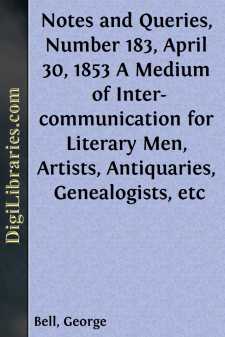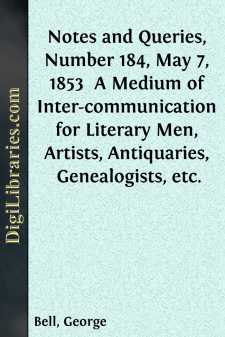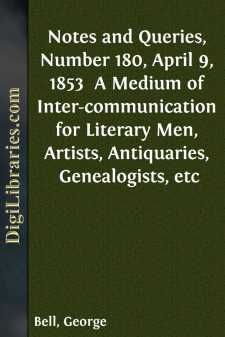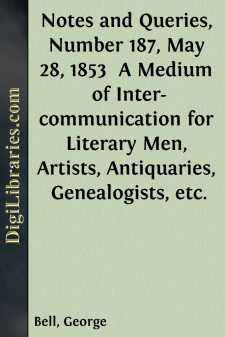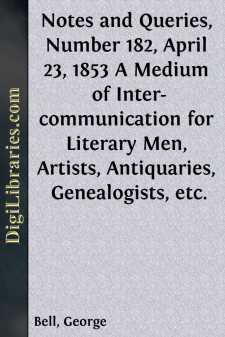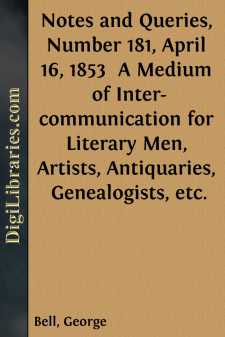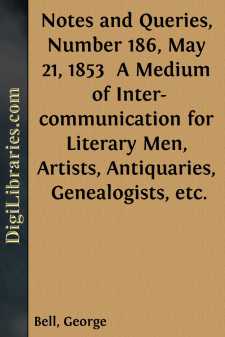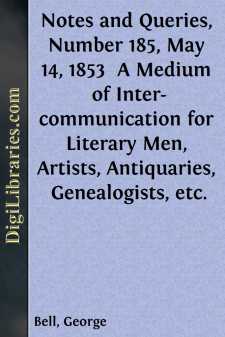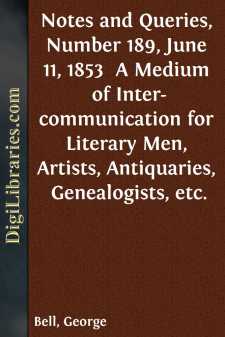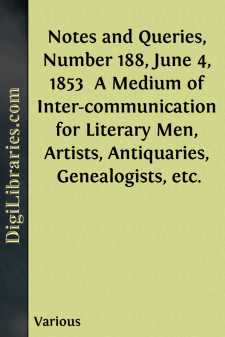Periodicals
- Art 27
- Children's periodicals 59
- Entertainment 5
- Food/Wine 2
- Games/Humor 455
- General 661
- Health 1
- History 53
- House/Home 1
- Regional 62
- Science/Nature 118
- Transportation 10
Periodicals Books
Sort by:
by:
George Bell
PROCLAMATION OF HENRY VIII. AGAINST THE POSSESSION OF RELIGIOUS BOOKS. The progress of the Reformation in England must have been greatly affected by the extent to which the art of printing was brought to bear upon the popular mind. Before the charms of Anne Boleyn could have had much effect, or "doubts" had troubled the royal conscience, Wolsey had been compelled to forbid the introduction or...
more...
by:
George Bell
OLD POPULAR POETRY: "ADAM BELL, CLYM OF THE CLOUGH, AND WILLIAM OF CLOWDESLY." I have very recently become possessed of a curious printed fragment, which is worth notice on several accounts, and will be especially interesting to persons who, like myself, are lovers of our early ballad poetry. It is part of an unknown edition of the celebrated poem relating to the adventures of Adam Bell, Clym...
more...
by:
George Bell
RIGBY CORRESPONDENCE. [We are enabled, by the kindness of their possessor, to lay before our readers copies of the following characteristic letters from the well-known Richard Rigby, Esq., who was for so many years the leader of the Bedford party in the House of Commons. They were addressed to Robert Fitzgerald, Esq., a member of the House of Commons in Ireland, and Judge of the Court of Admiralty in...
more...
by:
George Bell
ON CHAUCER'S KNOWLEDGE OF ITALIAN. In the Memoir prefixed to the Aldine edition of the Poetical Works of Chaucer, London, 1845, Sir Harris Nicolas expresses an opinion that Dan Geoffrey was not acquainted with the Italian language, and therefore not versed in Italian literature. "Though Chaucer undoubtedly knew Latin and French, it is by no means certain, notwithstanding his supposed...
more...
by:
George Bell
Notes. POETICAL EPITHETS OF THE NIGHTINGALE. Having lately been making some research among our British poets, as to the character of the nightingale's song, I was much struck with the great quantity and diversity of epithets that I found applied to the bird. The difference of opinion that has existed with regard to the quality of its song, has of course led the poetical adherents of either side to...
more...
by:
George Bell
"THE SHEPHERD OF BANBURY'S WEATHER-RULES." The Shepherd of Banbury's Rules to judge of the Changes of the Weather, first printed in 1670, was long a favourite book with the country gentleman, the farmer, and the peasant. They were accustomed to regard it with the consideration and confidence which were due to the authority of so experienced a master of the art of prognostication, and...
more...
by:
George Bell
LORD BACON'S "ADVANCEMENT OF LEARNING." Considering the large number of quotations from previous writers which occur in Lord Bacon's works, and especially in his most popular and generally read works—his Essays and his Advancement of Learning—it is remarkable how little his editors have done for the illustration of his text in this respect. The French editors of Montaigne's...
more...
by:
George Bell
ENGLISH BOOKS OF EMBLEMS. It is a remarkable circumstance that whilst the emblems of Alciatus Vent through almost innumerable editions, and were translated into most of the continental languages, no version of these Emblems should ever have been printed in this country, although we believe that MS. translations of them are in existence. It is remarkable also that more than half century should have...
more...
by:
George Bell
TOM MOORE'S FIRST! It is now generally understood that the first poetic effusion of Thomas Moore was entrusted to a publication entitled Anthologia Hibernica, which held its monthly existence from Jan. 1793 to December 1794, and is now a repertorium of the spirited efforts made in Ireland in that day to establish periodical literature. The set is complete in four volumes: and being anxious to see...
more...
by:
Various
NOTES ON SEVERAL MISUNDERSTOOD WORDS. (Continued from p. 522.) Dare, to lurk, or cause to lurk; used both transitively and intransitively. Apparently the root of dark and dearn. "Here, quod he, it ought ynough suffice, Five houres for to slepe upon a night: But it were for an olde appalled wight, As ben thise wedded men, that lie and dare, As in a fourme sitteth a wery hare." Tyrwhitt's...
more...


